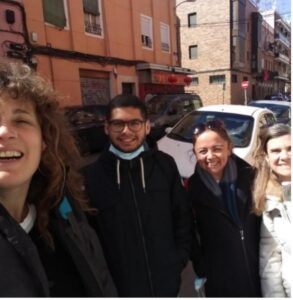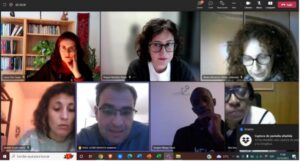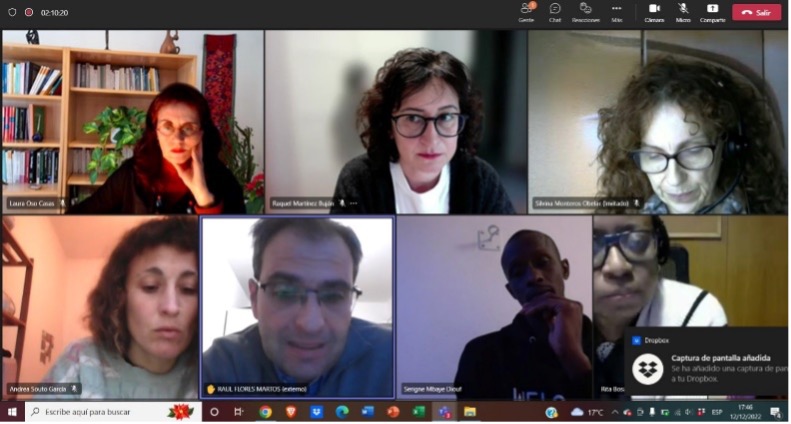During these months the Spanish team has been working closely with five peer-researchers from migrant communities–two women of Ecuadorian and Moroccan origin and three men of Algerian, Colombian and Senegalese origin–to develop the multi-sited fieldwork.
Peer-researchers were key in the design of the interview scripts and helped us to enter the fieldwork in Madrid and Galicia. It is necessary to highlight the role they have played as “cultural brokers” during the in-depth interviews. They accompanied us with those families which did not speak Spanish, translating the language, but also translating the cultural patterns functioning as a cross-cultural bridge.

Image: Peer-researchers meeting Madrid. Usera, April 2022.
So, during the first phase of fieldwork, we have conducted 75 interviews with members of 23 transnational families with strong care needs from Bolivia, Brazil, Colombia, Cuba, Ecuador, Honduras, Peru and Venezuela, Morocco and Senegal. We have interviewed people from different generations and with different gender, class and race ascriptions, to analyse how reproductive and productive work is organised around intersections of gender, age, disability, race and socio-economic status inequalities. We have also sought diversity in the political status of migrants (irregular migrants, regular migrants, nationalised migrants…), to explore the impact of Spanish migration policy on access to social protection, health, education, housing, and other basic rights.
In December 2022 we held the first Stakeholders Online meeting. Policymakers, relevant academics and also representatives from the Third Sector with good connections with the migrant social movements in Spain participated in the meeting along with the researchers of the University of A Coruña. The Stakeholders involved in this first meeting were Rita Bosaho, Director General for Equal Treatment and Ethnic-Racial Diversity of the Ministry of Equality; Serigne Mbaye. Member of the Sindicato de Manteros and Member of the Assembly of Madrid; Raúl Flores Martos, Coordinator of the research teams of Cáritas Española –the main NGO in Spain– and Technical Secretary of the FOESSA Foundation; and Silvina Montero, activist of the Association of Latin American and Caribbean Women and lecturer at the University of Granada.

Image: Stakeholders online meeting. December 2022.
In the meeting we discussed with the Stakeholders the preliminary results drawn from the analisys of the interviews conducted with migrants and their families.
During the Covid-19 pandemic in Spain, the health risk of the migrant population was accentuated. The confinement increased the risk of contagion among migrants due to the overcrowding in housing. Also, due to the racial segregation that structures Spanish labour market, migrant population is concentrated in low-skilled manual jobs, so they had no choice but to go out to work and expose themselves to infection.
In addition, fieldwork shows that migrant families have moved further away from the average standard of living and that their living conditions have worsened significantly, increasing inequality between locals and migrants. The measures taken by the Spanish Government to alleviate the effects of the economic crisis that came after Covid Pandemic, focused on the regularised population with formal contracts excluding from social protection people out of formal labour. So, those working in the informal sphere were not considered for receiving social protection, nor were domestic workers –fundamentally women– who, despite having a labour contract, were not eligible to social protection due to the Spanish Law of Work.
In the coming months, an open-door meeting with Stakeholders will take place in Madrid, bringing together policymakers, third sector associations and members of the migrant communities. There, we will discuss the more in-depth data drawn from the multi-situated and multi-method ethnography we are immersing in at this moment.
We will let you know about it very soon!

